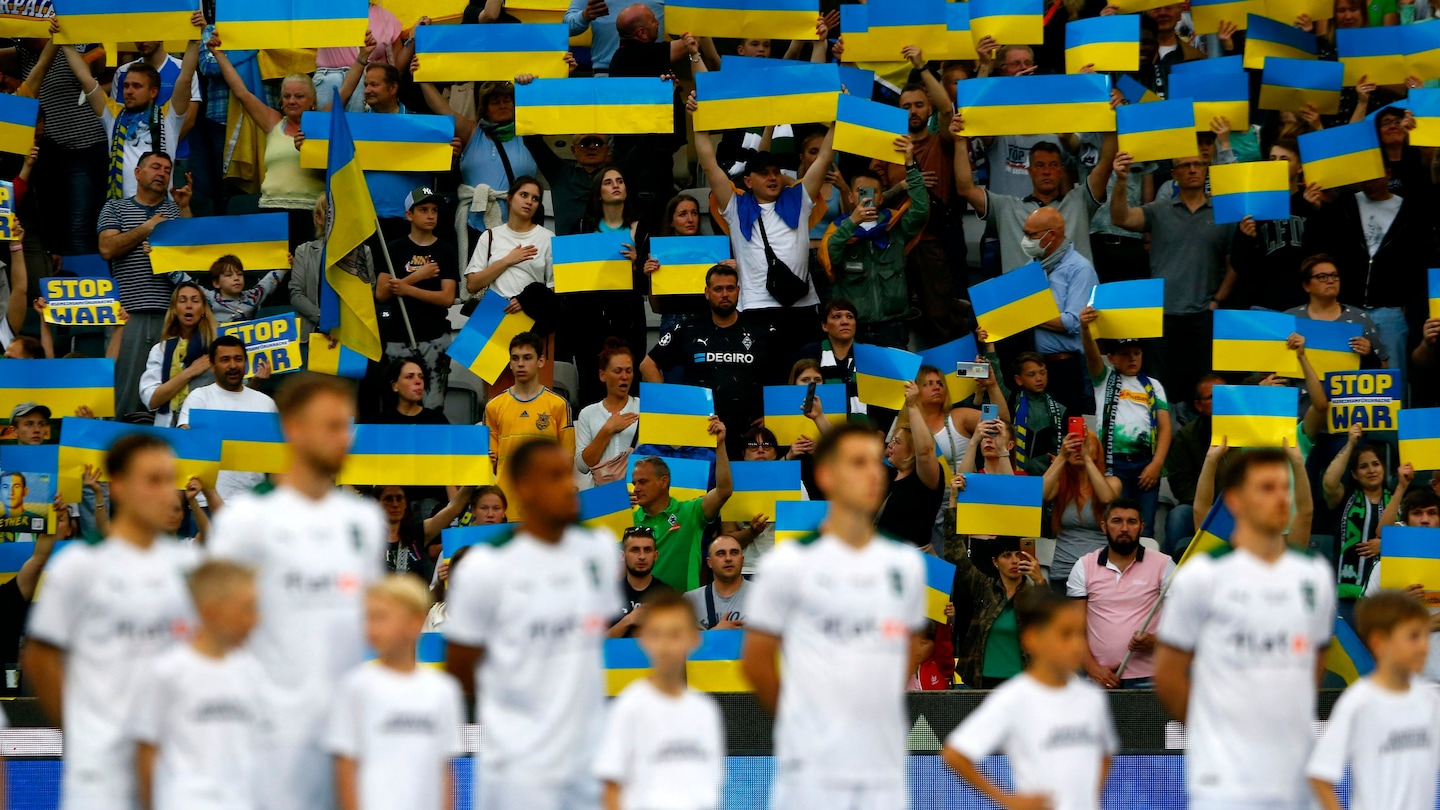Wednesday’s match, a friendly that benefited Ukrainian humanitarian causes and was free for all Ukrainian fans to attend, was a bittersweet return by the country’s national team. As some refugees appeared close to tears while watching their squad compete, the match in many ways also captured the country’s broader hopes for a quick return to some degree of normality and peace, even as Ukraine continues to face the prospect of a long war with Russia .
The team’s coach, Oleksandr Petrakov, said it was a sign “that life returns.”
“It distracts the [Ukrainian] people from the war, and it distracts the players from the war,” he told The Washington Post after the match.
Across the stadium, “Stop The War” signs were displayed on screens or held up as posters.
“The Ukrainian team is an emblem of the nation,” said Ukrainian refugee Vitaliy Ogorodnik, 37, who had come to the match with his 11-year-old son after fleeing the now Russian-occupied city of Kherson in the south of Ukraine.
Standing in the stadium, his son waved a Ukrainian flag that had “Kherson is Ukraine” written on it.
“Ukraine must win in football, and it must win the war,” Ogorodnik said.
The German fans in the stadium agreed.
“Today, I celebrate every goal, no matter which team,” said Stefan Kupper, 46, a longtime Mönchengladbach fan. “I’m rooting for peace today.”
As a friendly, Wednesday’s match had no impact on international rankings, and it was mostly seen as an opportunity for the Ukrainian team to catch up on matches and training it has missed out on over the past few months.
Coaching his team during times of war has been an emotional challenge for Petrakov. He has trained many of these players since they were boys, he said.
“They’re married, they have children now,” he said, but “for me, they are like my children.”
For Petrakov, this has meant having to strike a balance between showing empathy as a friend and continuing to demand top performance from his players.
“They understand,” he said.
Ukraine had last played in November, three months before Russia’s invasion. The team was scheduled to compete in a World Cup qualifying playoff match against Scotland in March, but that was postponed and is now slated for June 1.
Ukraine’s upcoming matches abroad — and especially the World Cup playoff in June — carry a weight that goes beyond sports, said Andrew Todos, a British-Ukrainian writer and podcaster who closely follows Ukrainian soccer.
“There’s a lot of hope that Ukraine can make it [to the World Cup]also for the world to see that Ukraine is still existing, still fighting,” he said, adding that the players “know the burden that is on their shoulders — the hopes of a whole nation.”
“The Ukraine national team has been very much a uniting power across the country” over the past years, Todos said.
Ukraine’s players spent the past few weeks training in Slovenia, and some Ukrainian clubs have played charity matches in neighboring countries to keep their fitness up.
But some of the team’s most important players, including Oleksandr Zinchenko, are still finishing up seasons with their club teams. They will only join the Ukrainian squad in the coming weeks.
“Every day I pray that they all stay fit, all stay in good health, because we need them,” Petrakov said.
When Manchester City’s Zinchenko recently appeared on the field during a match, Petrakov said to himself: “Thanks God, he’s fit. He has played, ”he recalled.
As is often the case in European soccer, the story of Ukraine’s national team is deeply intertwined with the country’s past.
During the Cold War era, when Ukraine was part of the Soviet bloc, the country’s soccer players were among the best in the former east bloc. When the Soviet team made it into the UEFA Euro Final in 1988 — one year before the fall of the Berlin Wall — it was packed with players from Kyiv’s main soccer club.
After the collapse of the Soviet Union, Ukrainian soccer was for years shaped by linguistic rivalries between Ukrainian clubs. But Russia’s annexation of Crimea in 2014 and the Russian invasion this year have united Ukrainian soccer more than ever, Everyone said.
“Many of those former [hardcore fans] that used to dismiss each other. . . are now fighting shoulder to shoulder,” Everyone said. “When it comes to your nation and the importance of freedom, we cast the divisions aside.”
As the players appeared on the field Wednesday, Khrystyna Soloviy, a 29-year-old Ukrainian singer-songwriter, took to the field to perform the Ukrainian national anthem.
Last year, she last performed the anthem in Kyiv’s main soccer stadium — a performance that now feels like a lifetime ago.
As Ukraine’s players sang alongside her, Soloviy hoped the lasting memory of Wednesday’s match would go beyond the final score.
For Petrakov, the coach, it was the most emotional moment of the match — even more so than the victory itself.
Every morning, he and his colleagues listen to the national anthem to observe a moment of silence and to honor those who have died. When he played Wednesday night, Petrakov struggled to hold back his emotions from him.
“I had tears in my eyes,” he said.
